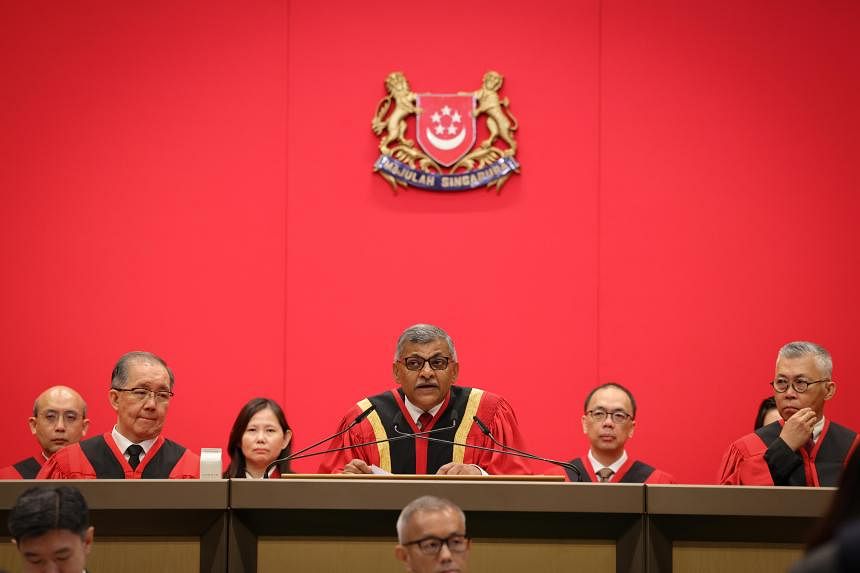
SINGAPORE – The selection criteria for the appointment of senior counsel – an elite group of lawyers recognised for their advocacy skills, knowledge of the law, and professional standing – have been refined.
Chief Justice Sundaresh Menon made the surprise announcement on Jan 8 at a ceremony to mark the opening of the legal year, held at the Supreme Court auditorium.
Near the end of his speech, at the point where it was customary to name the lawyers who have been appointed senior counsel for the year, the Chief Justice announced there were no appointments for 2024.
He said the selection committee had refined the appointment criteria to ensure that the people appointed would compare favourably with their international counterparts.
He added: “We will place greater emphasis on the applicants’ work that has tangibly contributed to the development of Singapore law, and on their contributions to the profession.”
He did not elaborate further.
Once a year, a selection committee comprising the Chief Justice, the Attorney-General and the judges of appeal evaluates applications and appoints those who are deserving of the distinction.
To date, 98 people have been appointed senior counsel since the scheme was started in 1997. No appointments were made in 2014.
The rest of Chief Justice Menon’s speech dealt with challenges facing the profession, including ethical and professional standards, legal education, and nurturing the next generation of lawyers.
He said a survey had shown that young lawyers want structured mentoring, better training and ethical formation, as well as more sustainable careers.
The Chief Justice said these issues had come up in the survey of young lawyers that was commissioned by a committee he set up in 2023 to study the rise in breaches of ethics and professional standards.
Two-thirds of survey respondents felt they could be better informed of the applicable professional standards, while only one in 10 said they had experienced a structured mentorship programme.
Chief Justice Menon said: “Law firms must recognise these changing expectations and strive to cultivate environments conducive to high professional standards and to retaining talent within the legal profession.”
He added that he has asked the committee – co-chaired by Justice Valerie Thean and Senior Counsel Jimmy Yim – to look more deeply into these issues and present its proposals in its final report.
Chief Justice Menon said: “If we are to successfully navigate the evolving landscape, bridging the generational gap between junior and senior practitioners will be essential for the profession’s sustained vitality and renewal.”
He said the committee’s interim report suggests the ethical health of the profession was reasonably good.
He added that while disciplinary violations had risen from 2018 to 2022 in absolute numbers, its proportion in relation to the growing numbers of the profession in the same period was encouragingly quite small.
Most of the infractions concern professional standards issues, which can often be addressed with training and mentorship, he said.
Of the complaints filed from Sept 1, 2018 to Aug 31, 2020, more than 70 per cent were dismissed, and fewer than 10 per cent of lawyers complained against were sanctioned by either a disciplinary tribunal or the Court of Three Judges.
The Chief Justice said he has accepted the committee’s interim proposals to address the gaps in ethical and professional standards. These include making ethics education a focus beginning in law school, and continuing as a mandatory part of learning throughout a lawyer’s career.
Another proposal was for a new ethics line managed by the Law Society of Singapore, where senior lawyers can provide less formal guidance on ethical issues.
Newly elected Law Society president Lisa Sam said the society will develop a directory that connects younger lawyers, who may be hesitant to set up their own firms due to a lack of office space and administrative support, with older lawyers, who have the resources to guide their juniors in setting up their practices.
Chief Justice Menon also highlighted the key recommendations of a working group that reviewed the legal education and training regime, to ensure that Singapore lawyers are equipped to meet the demands of modern legal practice.
The working group was co-chaired by Justice Audrey Lim and Permanent Secretary for Law, Mr Luke Goh.
The group recommended that professional ethics and conduct standards be expressly taught as part of the compulsory curriculum at law schools.
Another recommendation is to enhance the teaching of substantive civil law concepts, such as in Indonesian or Chinese law, to enable Singapore lawyers to deal with cross-border matters competently.
The working group also recommended the teaching of skills needed to meet client expectations, such as fundamental accounting and financial concepts, communication skills, and data literacy skills.
Also proposed was a legal sector competency framework, setting out the recommended courses for lawyers to take at different stages of their careers.
https://www.straitstimes.com/singap...efined-no-appointments-for-2024-chief-justice
